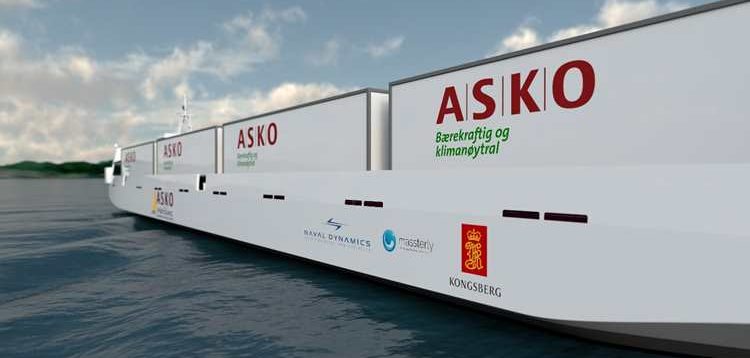Kongsberg Maritime and Massterly (a Kongsberg Wilhelmsen JV) have signed contracts with Norwegian grocery distributor ASKO to equip two new electric vessels with autonomous technology, and to manage their operations at sea. The fully electric ships are set to replace a fleet of truck transports, which the retailer hopes will save around 5,000 tons of CO2 per annum.
ASKO currently transports good using around 800 trucks per day, with road transport being the only means of linking its warehouses on the western side of the Oslo fjord with its distribution center on the eastern side. The two ro-ro ferries will cut out the road leg of this journey, significantly reducing emissions by approximately 5,000 tons of CO2 per year.
“We have a clear ambition to be climate neutral and have set ambitious goals, including being a self-sufficient provider of clean energy and having 100% emission-free transport by 2026. These innovative ships are key to fulfilling that ambition and will form an essential component of a zero-emissions logistics chain linking our facilities,” explained Kai Just Olsen, director, ASKO Maritime.
“Fully electric trucks will take the cargo between the warehouses and the ports of Moss and Horten, and in shipments of 16 the trailers will be transported across the fjord on the battery-driven vessels. This solution is cost effective, sustainable and will remove trucks from a heavily trafficked road.”
Kongsberg Maritime will supply the hardware required for zero emission and unmanned operation, while Massterly will ensure ship management and safe operations from its shore-based Remote Operations Centre. The two vessels will initially operate with a reduced crew, before moving toward entirely unmanned voyages.
Since the ASKO operation lies within Norway’s coastal jurisdiction, the Norwegian Maritime Authorities (NMA) must be satisfied that a sufficient level of safety has been achieved before they will issue an approval for operation for the vessels. NMA will therefore follow the project through a detailed risk assessment, based on IMO 1455 guidelines with regards to equivalent and alternative designs, new technology, verification, and approval for operation.
The vessels, which are due to be delivered early in 2022, have been designed by Norwegian vessel designer Naval Dynamics and will be constructed at the state-owned Cochin Shipyard in India.



